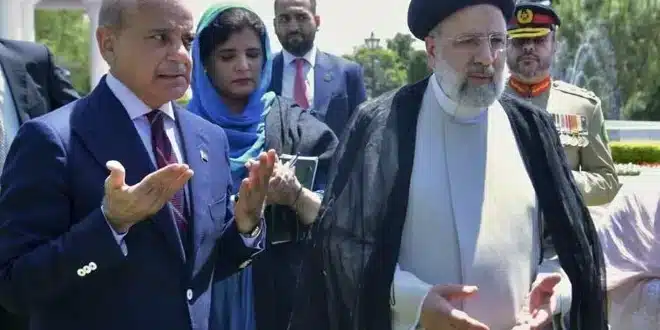The leaders of Iran and Pakistan pledged to deepen their economic and security ties during a meeting on Monday, aiming to heal recent diplomatic tensions.
The discussions took place in Islamabad as part of a three-day state visit by Iranian President Ebrahim Raisi, initiated shortly after his arrival. To ensure the safety of this high-profile visit, extensive security measures were implemented, including deploying extra police and paramilitary forces.
The backdrop for this diplomatic engagement includes a recent uptick in militant activities within Pakistan, often linked to the Pakistani Taliban and cross-border insurgent attacks affecting both Pakistan and Iran.
During the meeting at Prime Minister Shehbaz Sharif’s office, both leaders agreed on several bilateral cooperation initiatives, particularly emphasizing their mutual commitment to combating terrorism. They also expressed a unified stance against Israel’s actions in Gaza.
Prime Minister Sharif commended Iran for its firm position on Palestine and echoed similar sentiments of support from Pakistan. In his address to the media, President Raisi criticized Western nations, including the U.S., for backing Israeli operations in Gaza and called out international organizations for their lack of efficacy in defending human rights.
Additionally, Raisi underscored the need to enhance the currently minimal trade between the two nations and suggested the establishment of more border markets. The first of these markets was opened last year in Baluchistan, with plans for more under a 2012 agreement.
The two leaders also revisited discussions on a stalled multi-billion dollar gas pipeline project. Despite Iran completing its segment after a $2 billion investment, Pakistan has yet to finish its part, a delay that has strained relations. The pipeline, intended to deliver Iranian natural gas to Pakistan, has been on hold due to opposition from Washington, which cites violation of sanctions against Iran.
During his visit, President Raisi is scheduled to meet with Pakistani counterpart Asil Ali Zardari, who was instrumental in launching the pipeline project in 2013, and Pakistan’s Foreign Minister Ishaq Dar, with whom he discussed regional and international issues, reaffirming a commitment to peace and dialogue.
Accompanied by his spouse and a high-level delegation, Raisi’s itinerary includes stops in Karachi and Lahore, where he will meet Maryam Nawaz Sharif, the country’s recently elected first female chief minister.
This visit occurs amidst regional tensions, following an Iranian airstrike into Israel in retaliation for an Israeli strike in Syria, which killed two Iranian generals. Pakistan remains one of the countries that do not maintain diplomatic relations with Israel, primarily due to the unresolved Palestinian statehood issue.


